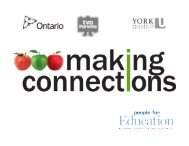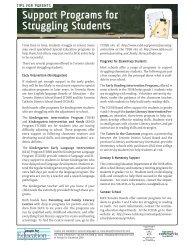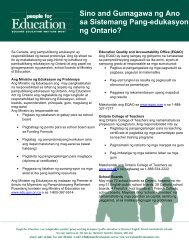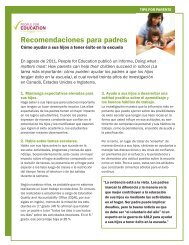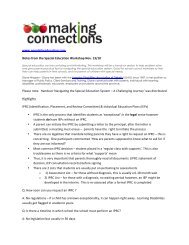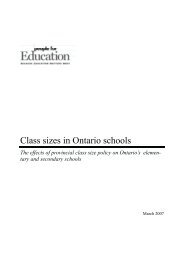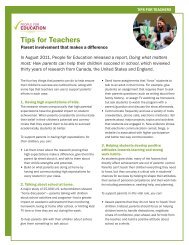Our Children Our Future Our Vision - People for Education
Our Children Our Future Our Vision - People for Education
Our Children Our Future Our Vision - People for Education
Create successful ePaper yourself
Turn your PDF publications into a flip-book with our unique Google optimized e-Paper software.
<strong>Our</strong> <strong>Children</strong>, <strong>Our</strong> <strong>Future</strong>, <strong>Our</strong> <strong>Vision</strong><br />
Thus the importance of local knowledge is far greater than often characterized.<br />
Indigenous ways of knowing share the following structure:<br />
(1) knowledge of and belief in unseen powers in the ecosystem;<br />
(2) knowledge that all things in the ecosystem are dependent on each other;<br />
(3) knowledge that reality is structured according to most of the linguistic<br />
concepts by which Indigenous describe it;<br />
(4) knowledge that personal relationships rein<strong>for</strong>ce the bond between persons,<br />
communities, and ecosystems;<br />
(5) knowledge that sacred traditions and persons who know these traditions<br />
are responsible <strong>for</strong> teaching “morals” and “ethics” to practitioners who<br />
are then given responsibility <strong>for</strong> this specialized knowledge and its dissemination;<br />
and<br />
(6) knowledge that an extended kinship passes on teachings and social practices<br />
from generation to generation. 20<br />
One can see how important that knowledge about local conditions and one’s traditions and languages<br />
are to the well-being of both individuals and communities. While the concepts within each<br />
unique Indigenous language may be different and traditional knowledge about each territory will<br />
depend on the elements of those specific ecosystems, the passing down of this knowledge was<br />
historically key to each Nation’s survival and prosperity - just as it is today.<br />
Since Traditional Indigenous knowledge (TIK) is based on local conditions, then the right to protect<br />
such knowledge involves far more than just the knowledge itself, but “issues of human rights,<br />
rights to the land and rights to self-determination”. 21 In this way, Indigenous knowledge is so<br />
inherently tied to the land that one cannot separate an Indigenous Nation from their land without<br />
significantly impacting their entire knowledge system and sense of identity.<br />
Why TIK is <strong>for</strong> us indeed a political question, a question of survival<br />
and rights <strong>for</strong> our future? There are a broad range of types of ideas<br />
as characteristic of TIK: ideas pertaining to environment, livelihoods;<br />
pertaining to oneself (health, medicine); pertaining to others<br />
(members of a community, ancestors and children); to conflicts, to<br />
pedagogy, and esthetics. Ideas as characteristic of TIK are not a collection<br />
of articulated biological, ecological, geographic<br />
observations and in<strong>for</strong>mation about nature, society and humans,<br />
ideas are the mover of the actions of an indigenous person, they<br />
motivate his current activities and provide the means of cultural<br />
continuation <strong>for</strong> his descendants. 22<br />
20 Protecting Indigenous Knowledge, supra note 2 at 42.<br />
21 E. Khamaganova, Buryat Baikal Center <strong>for</strong> Indigenous Cultures, “Traditional indigenous knowledge: local view”<br />
(Panama: United Nations, 2005), online: UN [Local View] at 1.<br />
22 Ibid. at 3.<br />
Chiefs of Ontario<br />
6



